I was more than excited to dive into the February 2018 edition of Crab Fat Magazine. This journal is available online for free, making it super accessible, and much to my elation upon entering the website, I was greeted by a welcoming little gif sticker that flashes between statements of inclusivity like “This journal is queer positive” and “This journal is asexual positive.” The journal actively seeks out the writing of marginalized folks.
NewPages Blog
At the NewPages Blog readers and writers can catch up with their favorite literary and alternative magazines, independent and university presses, creative writing programs, and writing and literary events. Find new books, new issue announcements, contest winners, and so much more!
Ekphrasis – Fall/Winter 2017
I will be first to admit that I can’t remember the amount of times I’ve gone into an art museum, looked at a brilliant or famous painting and thought, “I have no idea what to pay attention to.” As much as I wanted to make a connection, my knowledge of the nuances in lighting and space are more than limited. As the name suggests, Ekphrasis features poetry exclusively about other works of art of any genre. These poems attach a personal narrative or wild description to the work in such a way that I was able to get my bearings when I looked at the original piece. During a reading of this journal, it was helpful to have a device with internet access available so I could look at the paintings and sculptures as I read the ekphrastic poem. This journal helped me to slow down and think about art a little differently.
Spread the word!
22nd National Poet Hunt Contest Winners
Along with commentary from final judge Naomi Shihab Nye, the Winter 2018 issue of The MacGuffin, published by Schoolcraft College in Michigan, features winners of the 22nd National Poet Hunt Contest.
 First Place
First Place
“The Last Time I head Her Play the Piano” by Bethany Reid [pictured]
Honorable Mention
“Big Sky Drive-in” by Kathleen McClung
“An Ordinary Afternoon” by Sue Fagalde Lick
Spread the word!
Lit Mag Covers :: Picks of the Week
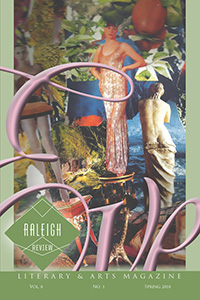 The Spring 2018 issue of Raleigh Review Literary and Arts Magazine features “Eve,” a lush collage by Geri Digiorno.
The Spring 2018 issue of Raleigh Review Literary and Arts Magazine features “Eve,” a lush collage by Geri Digiorno.

“Summer Rain” by Kristina Gehrmann on the Spring 2018 cover of Rattle poetry journal brightened my day, as did the special section inside the publication, “Tribute to Immigrant Poets,” which includes works by 18 poets who “no longer reside in their country of birth.”
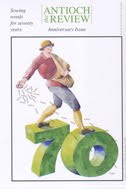
“Challenging Transitions” is the theme of most recent issue of The Antioch Review. Like the theme, David Battle’s cover image could be broadly interpreted but also directly reflective of Robert S. Fogarty’s Editorial, “The Brooklyn Bridge and Other Transitions.”
Spread the word!
New Lit on the Block :: The HitchLit Review
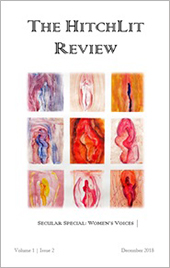 The HitchLit Review: A Secular Literary-Arts Journal publishes online twice per year, poetry, fiction, and non-fiction, and would consider short, stand-alone scenes from plays and screen plays as well as visual art and cover design. “There are many literary magazines,” The HitchLit Review Founder and Editor Daniel Ruefman tells me, “but in a growing community of secular voices, few publications are focused on giveing them a platform. In addition to that, there are a lot of misunderstandings about what it means to be secular today (atheist, agnostic, freethinker, skeptic, etc.). By highlighting secular voices through literature and art, HitchLit hopes to confront stereotypes and demonstrate just how diverse the secular community is.”
The HitchLit Review: A Secular Literary-Arts Journal publishes online twice per year, poetry, fiction, and non-fiction, and would consider short, stand-alone scenes from plays and screen plays as well as visual art and cover design. “There are many literary magazines,” The HitchLit Review Founder and Editor Daniel Ruefman tells me, “but in a growing community of secular voices, few publications are focused on giveing them a platform. In addition to that, there are a lot of misunderstandings about what it means to be secular today (atheist, agnostic, freethinker, skeptic, etc.). By highlighting secular voices through literature and art, HitchLit hopes to confront stereotypes and demonstrate just how diverse the secular community is.”
Continue reading “New Lit on the Block :: The HitchLit Review”
Spread the word!
Michael Dowdy MSR Poetry Book Award Winner
 The Winter 2017-2018 issue of The Main Street Rag features an interview with Michael Dowdy, author of URBILLY, winner of the 2017 Main Street Rag Poetry Book Award. In it, Dowdy talks about his lifelong love of books and choice of the “academic route” over his “recessive hillbilly” DNA strain, his shifting majors in college, taking a stab at the family business, how the poetry for URBILLY came about, and his interests from Appalachian Latino literature to “undocumentary” poetry.
The Winter 2017-2018 issue of The Main Street Rag features an interview with Michael Dowdy, author of URBILLY, winner of the 2017 Main Street Rag Poetry Book Award. In it, Dowdy talks about his lifelong love of books and choice of the “academic route” over his “recessive hillbilly” DNA strain, his shifting majors in college, taking a stab at the family business, how the poetry for URBILLY came about, and his interests from Appalachian Latino literature to “undocumentary” poetry.
Spread the word!
New Orleans Review Online Only
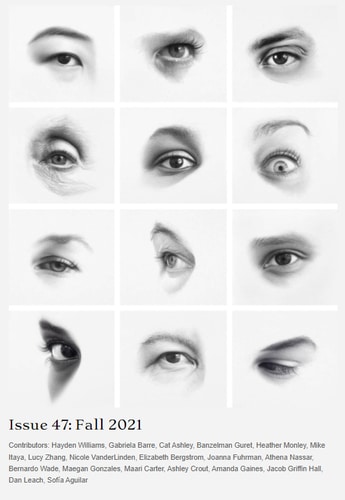 The Editor’s Note in New Orleans Review Issue 43 (Themed: “This Hustle Is Not Your Grandpa’s African Lit”) contained the following announcement:
The Editor’s Note in New Orleans Review Issue 43 (Themed: “This Hustle Is Not Your Grandpa’s African Lit”) contained the following announcement:
“Since its founding in 1968, New Orleans Review has had the pleasure of including in its pages the work of hundreds of writers, poets, essayists, critics, celebrities, and artists from around the world. We take particular delight in having published numerous ‘first-time-in-print’ authors as well as offering eclectic volumes on a range of topics and forms – from Alexander Pope’s ‘The Rape of the Lock’ to Post-Structuralism, from Spanish-language film to Czech writing in translation, and from Science Fiction to a set of seven chapbooks enclosed in a slipcase. As the journal enters its 50th year, this special issue on contemporary writing from Africa celebrates our final printed volume. Both honoring its past and embracing its future, New Orleans Review will continue to publish new work in an expanded digital venue, which will also include free access to all 50 years of print issues.”
Spread the word!
Glimmer Train 2017 Family Matters Contest Winners
Glimmer Train has just chosen the winning stories for their Family Matters competition. This competition is held once a year and is open to all writers for stories about family of all configurations. Glimmer Train’s monthly submission calendar may be viewed here.
1st place goes to  Peter Nathaniel Malae [pictured] of McMinnville, Oregon, who wins $2500 for “El Camino.” His story will be published in Issue 103 of Glimmer Train Stories.
Peter Nathaniel Malae [pictured] of McMinnville, Oregon, who wins $2500 for “El Camino.” His story will be published in Issue 103 of Glimmer Train Stories.
2nd place goes to Gregory J. Wolos of Millis, Massachusetts, who wins $500 for “Boy Strangling Goose.” His story will also be published in an upcoming issue of Glimmer Train Stories, increasing his prize to $700.
3rd place goes to Chloe Higgins of Wollongong, Australia, who wins $300 for “Things We Cannot Say.”
Here’s a PDF of the Top 25.
Spread the word!
New Lit on the Block :: Twyckenham Notes
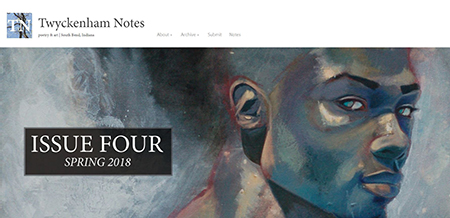 Twyckenham is a name linked strongly with South Bend and Twyckenham Notes Editor in Chief Austin Veldman, who grew up there at a time when the economic slump felt by many post-automobile industry cities lingered on. “In the early 2000’s,” Veldman says, “the prevalent attitude of the town’s youth was not lost on me: I wanted to leave as soon as I could. The common words among most were there is nothing to do here.” And yet, not even a decade later, Veldman founded Twyckenham Notes in response to what he saw happening in his city, “a reemergence, the founding of a new identity,” contributing literature to help in this rebirth and renewal.
Twyckenham is a name linked strongly with South Bend and Twyckenham Notes Editor in Chief Austin Veldman, who grew up there at a time when the economic slump felt by many post-automobile industry cities lingered on. “In the early 2000’s,” Veldman says, “the prevalent attitude of the town’s youth was not lost on me: I wanted to leave as soon as I could. The common words among most were there is nothing to do here.” And yet, not even a decade later, Veldman founded Twyckenham Notes in response to what he saw happening in his city, “a reemergence, the founding of a new identity,” contributing literature to help in this rebirth and renewal.
Spread the word!
These Are Our Demands
The twelve stories in These Are Our Demands dip their toes into potential futures and alternate realities. The characters in Matthew Pitt’s stories are vivid and sassy, and the writing is otherworldly. This collection lures you in with the promise of comfort, and then pulls down the straps and sends you on an unexpected wild ride. The stories have an unrivaled originality that is bound to keep you reading till the las page.
Spread the word!
The Church in the Plains
Rachel Rinehart’s new collection The Church in the Plains is a historical, cultural, and religious journey, as Rinehart explores her German Lutheran roots in a richly reflective and imaginative book of poetry. With a knack for rendering human peculiarities and foibles, Rinehart writes poetry with echoes of Robert Lowell and the confessional poets, but with a streak of heritage and flair all her own.
Spread the word!
Bright Raft in the Afterweather
Jennifer Elise Foerster’s brand-new poetry collection Bright Raft in the Afterweather is an elegant, lyrical journey across lands near and far and times past, present, and future. A very gifted poet with an NEA Creative Writing Scholarship, a Lannan Foundation Writing Residency Scholarship, and a Wallace Stegner Fellowship, Foerster, a member of the Muscogee Nation of Oklahoma, writes poems that are teeming with connection to the natural world, yet also aware of the dangers of human greed.
Spread the word!
Some Beheadings
A thing is a cicada when it tends toward sexual disorientation
& I is an orient in the sense that all things wend toward me.
Aditi Machado’s debut collection, Some Beheadings, is a delicate meditation on the origin of thought. Somewhere between Wittgenstein and Rilke, with splatterings of Gertrude Stein, each page is a flower opening to reflect spring. “A wind blows, the desert unfolds.” “The desert melts, the sky’s glass.” Some Beheadings reads like bits of a shattered rainbow.
Spread the word!
Tina Goes to Heaven
If I told you the quick plot summary of Tina Goes to Heaven, by Lois Ann Abraham, you might visualize a familiar movie reel of hooker-with-a-heart-of-gold stories, and then you might yawn and ask me what else I was reading. But you’d have it wrong, and I’d have done you a grave disservice. Continue reading “Tina Goes to Heaven”
Spread the word!
Like a Champion
Have you ever taken homemade food to a picnic just to have it ignored? Then you might recognize yourself in Vincent Chu’s story called “Ambrosia,” which appears in his first book of short fictions, Like a Champion. In it, our narrator’s girlfriend brings the sweet dessert to a barbecue with this result: “In the middle of the table sits the uneaten ambrosia, cubes of strange fruit drowning slow deaths in white glob, wincing under the summer sun.” But in this case, a simple sentence will turn the embarrassing situation around with unexpected results.
Spread the word!
Mud Song
Terry Ann Thaxton approaches her third book of poetry, Mud Song, with a native Floridian’s familiarity. We know about Florida oranges, alligators, and hurricanes, and she doesn’t ignore these attributes, but there’s a lot more of Florida in her book that won the 2017 T. S. Eliot Prize for Poetry.
Spread the word!
Peluda
Okay, ready? Would you rather be completely covered in fur, like, head-to-toe, monster type of shit or, stay with me, stay with me, be completely smoothie-smooth in all of the right places: thighs, crotch, armpit, upper lip, neck?
— from “We Play Would You Rather at the Galentine’s Day Party”
Spread the word!
Books :: 2017 Autumn House Press Contest Winners
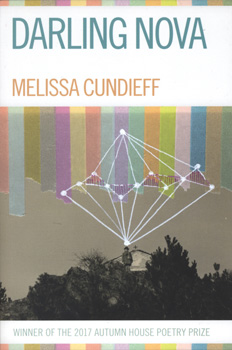 Autumn House Press annually hosts contests for full-length manuscripts of fiction, nonfiction, and poetry. Each winner receives publication, and $2,500 ($1,000 advance against royalties and $1,500 for travel and publicity). The 2017 winners will be available for purchase next month.
Autumn House Press annually hosts contests for full-length manuscripts of fiction, nonfiction, and poetry. Each winner receives publication, and $2,500 ($1,000 advance against royalties and $1,500 for travel and publicity). The 2017 winners will be available for purchase next month.
In fiction, Glori Simmons’s Carry You, selected by Amina Gauthier, is an intense read, a linked collection of intertwined stories. Advance praise calls the collection gorgeous, moving, and deeply empathetic.
Dickson Lam’s memoir Paper Sons was selected by Alison Hawthorne Deming. Paper Sons combines memoir and cultural history, violence marking the story at every turn. Deming calls the book important and “beautifully crafted, rich in poetic image and juxtapositions.”
Alberto Ríos selected Darling Nova by Melissa Cundieff as the poetry 2017 poetry winner. The collection makes “new connections, new sparks, new thoughts as often as line to line,” and covers “grief, love, humanness,” moving readers.
While you’re learning more about the 2017 prize winners, be sure to stop by the contest submission guidelines: entries are now open until the end of June.
Spread the word!
Books :: 2017 Lena-Miles Wever Todd Prize Winner Published
 Available this month is the winner of the 2017 Lena-Miles Wever Todd Prize for Poetry: Bridled by Amy Meng. Selected by Jaswinder Bolina, Bolina says of his selection:
Available this month is the winner of the 2017 Lena-Miles Wever Todd Prize for Poetry: Bridled by Amy Meng. Selected by Jaswinder Bolina, Bolina says of his selection:
Bridled is poetry as slow-burn opera. [ . . . ] The poems here offer, in reverse chronology, the story of a crumbling relationship between an unnamed speaker and her nameless ‘lover.’ In this telling, Bridled articulates a politics of self versus other, of body and gender, of loneliness and togetherness. It’s a collection you’re going to want to read from start to finish and then from finish to start.
A Kundiman Fellow and poetry editor at Bodega Magazine, this is Amy Meng’s first collection. Stop by the Pleaides Press website to learn more.
Spread the word!
Glimmer Train Nov/Dec 2017 Very Short Fiction Winners
Glimmer Train has just chosen the winning stories for their 2017 November/December Very Short Fiction Award. This competition is held three times a year and is open to all writers for stories with a word count under 3000. The next Very Short Fiction competition will take place in March 2018. Glimmer Train’s monthly submission calendar may be viewed here.
 1st place goes to Corey Flintoff [pictured] of Cheverly, Maryland, who wins $2000 for “Early Stages.” His story will be published in Issue 103 of Glimmer Train Stories. This will be his first major print publication.
1st place goes to Corey Flintoff [pictured] of Cheverly, Maryland, who wins $2000 for “Early Stages.” His story will be published in Issue 103 of Glimmer Train Stories. This will be his first major print publication.
2nd place goes to Irene Doukas Behrman of Portland, Oregon, who wins $500 for “Permission.”
3rd place goes to Itoro Udofia of Oakland, California, who wins $300 for “To the Children Growing Up in the Aftermath of Their Parents’ War.”
Here’s a PDF of the Top 25.
Deadline soon approaching! Short Story Award for New Writers: February 28
This competition is held three times a year and is open to all writers whose fiction has not appeared in a print publication with a circulation over 5000. No theme restrictions. Most submissions to this category run 1000-4000 words, but can go up to 12,000. First place prize wins $2500 and publication in Glimmer Train Stories. Second/third: $500/$300 and consideration for publication. Click here for complete guidelines.
Spread the word!
Lit Mag Covers :: Picks of the Week
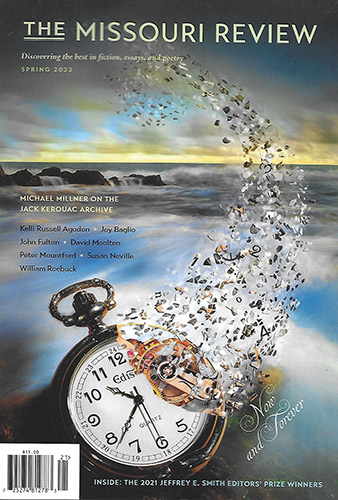
The Missouri Review v40 n4, 2017 features intriguing cover art by Su Blackwell entitled “Heroines of Literature,” a finely crafted paper sculpture. More of Blackwell’s work can be viewed on her website.

According to Editor and Founder Robert Stapleton, Booth 11 is a “stunning collection of contemporary femal writers. The issue includes new fiction, nonfiction, poetry comics, lists, and interviews by such esteemed authors as Emily St. John Mandel, Joyce Carol Oates, Marya Hornbacher, Elizabeth Strout, Krista Christensen, Aubrey Hirsch, Brenda Shaughnessy, and so many more. This full-color literary journal offers a powerful argument for the strength of female authors working in American letters.” Beginning it all: cover art by Tara McPherson.
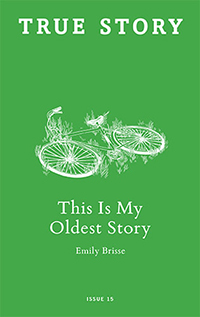 The cover image by Lucy Engelman made me open Issue 15 of Creative Nonfiction’s monthly publication, True Story, the opening paragraph of “This Is My Oldest Story” by Emily Brisse made me drop everything and just read. It begins: “In May of 1992, a little before the end of fourth grade, my best friend Kristy and I and a few others from our street – Ryan, Tim, Tom, maybe Naomi – hopped on our bikes and started riding. Most of us had younger brothers, and we left them at home. We didn’t tell our parents we were going. They thought we were in the basement of Tim’s house, playing Tetris, and although their anxiousness had relaxed by inches over the past two and a half years, we knew that any request to bike farther than the outlined boundary of our street would receive a firm no. So we just went.”
The cover image by Lucy Engelman made me open Issue 15 of Creative Nonfiction’s monthly publication, True Story, the opening paragraph of “This Is My Oldest Story” by Emily Brisse made me drop everything and just read. It begins: “In May of 1992, a little before the end of fourth grade, my best friend Kristy and I and a few others from our street – Ryan, Tim, Tom, maybe Naomi – hopped on our bikes and started riding. Most of us had younger brothers, and we left them at home. We didn’t tell our parents we were going. They thought we were in the basement of Tim’s house, playing Tetris, and although their anxiousness had relaxed by inches over the past two and a half years, we knew that any request to bike farther than the outlined boundary of our street would receive a firm no. So we just went.”
Spread the word!
New Lit on the Block :: MORIA Literary Magazine
 Olives are a succulent fruit, each containing a seed with which to grow more nourishing deliciousness. What better inspiration, then, for MORIA, the new literary publication from Woodbury University, where an olive grove once stood on the land that now houses this Californian educational institution.
Olives are a succulent fruit, each containing a seed with which to grow more nourishing deliciousness. What better inspiration, then, for MORIA, the new literary publication from Woodbury University, where an olive grove once stood on the land that now houses this Californian educational institution.
Faculty Editor of MORIA Literary Magazine, Dr. Linda L. Dove, tells me MORIA refers to a special type of olive tree in ancient Greece that is protected by the government. “As a tree sacred to Athena, the goddess of wisdom, the original ‘Moria’ was believed to have been planted by her at the Parthenon and includes the meaning ‘to be part of’ something larger than itself. Here at the literary magazine, we recognize and celebrate that Woodbury University is a part of a tradition of learning that is larger than itself, just as literature and the writers who make it are part of a tradition of creative engagement and cultural production that is larger than any one individual alone.” Beautiful.
Continue reading “New Lit on the Block :: MORIA Literary Magazine”
Spread the word!
Malahat Review 2017 Prize Winners
The Malahat Review issue #201 (Winter 2017) includes two prize winning works:
 Far Horizons Award for Short Fiction
Far Horizons Award for Short Fiction
Selected by Steven Price
“Faster Horses” by Katherin Edwards
Constance Rooke CNF Prize
Selected by Brian Brett
“Flaubert’s Hummingbirds” by Nancy Holmes [pictured]
Read more about The Malahat Review prizes as well as interviews with each of the winners here.
Spread the word!
Question Everything Advises Danielle Lazarin
 In her craft essay in the February 2018 #133 issue of Glimmer Train’s Bulletin, Danielle Lazarin tells readers to “Question Everything” as she does in her own drafting process. Her essay opens:
In her craft essay in the February 2018 #133 issue of Glimmer Train’s Bulletin, Danielle Lazarin tells readers to “Question Everything” as she does in her own drafting process. Her essay opens:
“On some days, my writing notebooks look like an inquisition, my pages topped and ended with questions: in all-caps, underlined, circled. Many are small: What do the kids want to be called? What is her work? Handwriting=obsessive or careless? Maybe she cries on the subway home, after dinner? But they’re big, too: What is true, the memory of it, or the moment? Is she lacking? DO WE REQUIRE HOPE? Though they may appear frantic, a series of scribbled questions aren’t signs of confusion or desperation but of sufficient curiosity on my part to propel a story forward. At every stage of my work, questions are my most essential writing tools. I use them to move through to the other side of murky. It’s only by stepping into that unknown and uncomfortable space repeatedly during my process that I can become more deliberate in the story I’m telling.”
Also included in this month’s GT Bulletin are Thomas Fox Averill’s “Writing Archival Fiction” and Aline Ohanesian “On Rejection.” The Bulletin is free to read online and have delivered monthly to your e-mail.
Spread the word!
Lit Mag Covers :: Picks of the Week
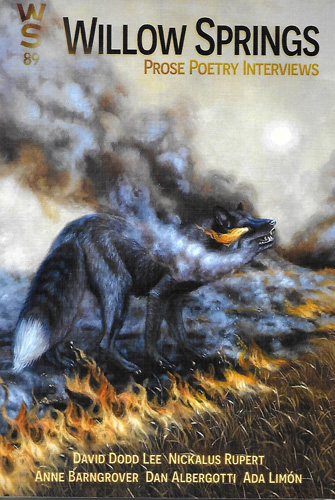
Willow Springs Issue 81 features this brightly colored image, originally a 13 x 13 silkscreen. The “inside cover” replicates this image, but with “Spokane Garbage Goat” replacing the issue number. I had no idea what this was, so promptly headed to Google, where I learned of the iconic status of said goat. Absolutely delightful, as is artist Chris Bovey’s work, more of which can be found at Vintage Prints.
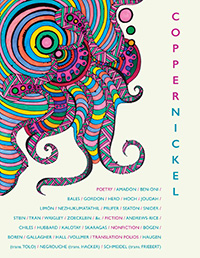
Rebecca Berlin’s marker on paper “Circles That You Find” brightens the cover of the Spring 2018 (#26) issue of Copper Nickel. See more of her work at Rebecca Berlin Art.

Keeping with vibrant colors, The Fiddlehead Winter 2018 (# 274) issue features Monika Wright’s “With Powerful Intention” acrylic on canvas. In her artist’s statement, Wright comments, “With organic shapes, fluid light, lines and circles, I am employing universal symbols of unity, wholeness and infinity connected by lines, representing the boundaries which separate us, but which also highlights our shared path.” See more of her work here.
Spread the word!
Prime Number Magazine – January/February 2018
The phrase “prime number” is one that generally gives me the chills, reminding me of past days of math classes and the frustration tied to them. However, Prime Number Magazine manages to have the opposite effect: it’s a fun and quirky online journal with a lot to offer readers.
Continue reading “Prime Number Magazine – January/February 2018”
Spread the word!
Geist – Fall 2017
I was pleasantly intrigued looking through this Fall 2017 issue of the Canadian literary magazine, Geist. Between the unique artwork and photographs, I found interesting poems, anecdotes of encounters with native peoples, and unique short stories, culminating in a cryptic crossword puzzle that I am compulsively returning to.
Spread the word!
The Healing Muse – Fall 2017
As a journal published by the Center for Bioethics and Humanities, The Healing Muse has a commitment to encouraging healthcare that is personal and compassionate. In a time when our access to healthcare in America is being regularly threatened, the work done by this journal is essential as ever. Featuring work that centers exclusively on the body and illness, The Healing Muse is a shining example of the power of medical humanities.
Spread the word!
Hiram Poetry Review – Spring 2017
The cover of Hiram Poetry Review’s 78th issue features a photo of two young men who look like they are turn of the century bohemians, one holding a mandolin in his hands, the other with an open book, neither looking into the camera or at each other. They look kind of baffled by their own existence, like they’re thinking about the passage of time. Maybe I’m projecting a little, but regardless, I felt it captured the themes of this edition nicely. The pieces in this edition seemed particularly interested in growing older and how we change or fail to change.
Spread the word!
Eleven Eleven – 2017
Issue 23 is notable for a number of reasons, including the departure of longtime Faculty Editor Hugh Behm-Steinberg—and what an exit it is. The current issue of Eleven Eleven (8” x 8” if you’re curious) is large, daring, fun, and occasionally a hot mess. Consistency is hard to achieve with student-run publications; editors are cycling out each year as new staff comes whirling in, and errors occasionally slip through the cracks. In most cases, the missed edits are those spellcheck would ignore—e.g. a “bowl” movement or a phrase in Latin “hat” translates—but others, like “Dega’s painting” (it should be Degas’ or Degas’s), remain unchanged too, unfortunate blemishes on otherwise pristine pages. Viewed separately, these missed edits are minor blips, but piled together (and there are plenty more), the issue is cheapened, and even the best pieces, impeccably written and edited as they may be, are done a disservice.
Spread the word!
2017 Able Muse Write Prize Winners
Winners and finalists for the 2017 Able Muse Write Prize for Poetry and Fiction are featured in the Winter 2017 issue of Able Muse: A Review of Poetry, Prose & Art.
 Write Prize for Fiction
Write Prize for Fiction
Final Judge: Jill Alexander Essbaum
Winner: “Target” by Leslie Jill Patterson
Write Prize for Poetry
Final Judge: Annie Finch
Winner: “Fall Rewinding” by D. R. Goodman [pictured]
Finalists: Ann M. Thompson; Scott Ruescher; Rob Wright
For a full list of honorable mentions and short list selections, visit the Able Muse 2017 Write Prize announcement page.
Spread the word!
The Florida Review Prison Focus

The Florida Review Editor and Director Lisa Roney in the 41.2/2017 issue Editor’s Note writes in a recurring thread about the U.S. prison culture, her early experiences knowing young people who went in and out of jail, and – of all things – changing the publication’s submission policy to accept traditional postal submissions from those without Internet access, “whatever the circumstances might be.” This, of course, would open submissions to our nation’s incarcerated population who are not allowed access to the Internet.
About the Special Section on Prison, Roney writes, “we include writing by prisoners, as well as their family members and friends. It is the presence of this Triumvirate (victims, prisoners, family and loved ones) that testifies to the widespread tragedy that violence, addiction, and poverty and their results have become in this country – and our constant sense that there must be some better way. Writing, of course, is one of those better ways.”
Spread the word!
2017 Gulf Coast Prize Winners
The Winter/Spring 2018 issue of Gulf Coast features the winners of their 2017 Gulf Coast Prizes contest:
 Poetry
Poetry
Judged by Cate Marvin
“The Weather Underground” by sam sax
Nonfiction
Judged by Diane Roberts
“The Peacock and the Bell Captain” by Spencer Wise
Fiction
Judged by Chinelo Okparanta
“That Boy Could Run” by Rudy Ruiz [pictured]
For a full list of honorable mentions and biographical information on each writer and judge, visit the Gulf Coast Prize page.
Spread the word!
ALA Intellectual Freedom Blog
 Intellectual Freedom Blog hosted by the Office for Intellectual Freedom, a unit of the American Library Association, provides “a venue for coverage of time-sensitive news in intellectual freedom and librarianship.” The topics, however, are of interest to a much wider audience, including writers, readers, and academics – teachers, students, and administrators. Recent post titles include: “Is There a Connection Between Mental Health and Intellectual Freedom?” by Allyson Mower; “‘The Post,’ the Pentagon Papers, and the Era of Fake News” by Robert Sarwark; “Xicanas/Latinas and Intellectual Freedom in College: When Reading is Political” by Eva Rios-Alvarado; “Reading as a Mirror: Banning the New Jim Crow in New Jersey Prisons” by Jane’a Johnson [pictured]; and weekly roundups of Intellectual Freedom News.
Intellectual Freedom Blog hosted by the Office for Intellectual Freedom, a unit of the American Library Association, provides “a venue for coverage of time-sensitive news in intellectual freedom and librarianship.” The topics, however, are of interest to a much wider audience, including writers, readers, and academics – teachers, students, and administrators. Recent post titles include: “Is There a Connection Between Mental Health and Intellectual Freedom?” by Allyson Mower; “‘The Post,’ the Pentagon Papers, and the Era of Fake News” by Robert Sarwark; “Xicanas/Latinas and Intellectual Freedom in College: When Reading is Political” by Eva Rios-Alvarado; “Reading as a Mirror: Banning the New Jim Crow in New Jersey Prisons” by Jane’a Johnson [pictured]; and weekly roundups of Intellectual Freedom News.
Spread the word!
The Massachusetts Review: More than a Lit Mag
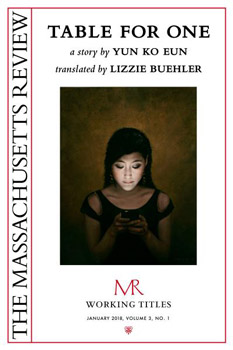 Readers may already be familiar with The Massachusetts Review, the quarterly print journal founded in 1959, but did you know they also have digital projects available?
Readers may already be familiar with The Massachusetts Review, the quarterly print journal founded in 1959, but did you know they also have digital projects available?
Working Titles are e-publications of prose which are too long to be printed in the quarterly. Published bimonthly, there are three ways to purchase and download Working Titles. Recent publications include Table for One by Yun Ko Eun translated by Lizzie Buehler, The Keepers of the Ghost Bird by Jenn Dean, The Leader by Nouri Zarrugh, and more.
Readers can also find Digital Chapbooks, showcasing art and poetry from past special sections and art inserts throughout the years of the journal. These features are free to read and easy to access, a good way to spend some time.
While you’re checking out the current “Truth” issue of The Massachusetts Review, be sure to see what digital offerings are up for grabs.
Spread the word!
The Real Life of the Parthenon
Patricia Vigderman’s book, The Real Life of the Parthenon, appealed to me because, like her, I’d walked up to the Acropolis in Athens, Greece. My walk was during a honeymoon, hers—for the most part—were more empirical.
Spread the word!
The Amazing Mr. Morality
The Amazing Mr. Morality is a collection that dives head first into the shallow end of a pool full of ethical dilemmas. Jacob M. Appel creates wild worlds just inches beyond reality, but still close enough to the real deal that you can absolutely imagine them coming true. The writing is sharp, the characters are witty, and the stories are original.
Spread the word!
The Stargazer’s Embassy
Eleanor Lerman began her writing career at twenty-one as a poet, branching out over the years into short stories and novels while winning prizes along the way. Her latest book is a suspense-filled science fiction novel called The Stargazer’s Embassy.
Spread the word!
Marvels of the Invisible
“Another endangered syntax descends.” —from “Echolocations”
If ex-poet-laureate Billy Collins is correct in saying that poetry is “everyday moments caught in time,” then Jenny Molberg’s debut collection The Marvels of the Invisible, winner of 2014 Berkshire Prize, is exemplar. As if flipping through a family album, Molberg covers a personal history from birth to death, hospital and bible, family and landscape, hope and redemption.
Spread the word!
This Must Be the Place
At times in life, we dive in, ready for action. At other times, often in transitional phases, we hang back and observe, browsing through possible lives and paths we might pursue.
Spread the word!
American Life in Poetry :: Connie Wanek
American Life in Poetry: Column 670
BY TED KOOSER, U.S. POET LAUREATE
I’m writing this column on a very cold day, and it’s nice to be inside with a board game to play, but better yet, for me at least, to be inside with a poem about a board game. This Monopoly game by Connie Wanek is from her book Rival Gardens: New and Selected Poems from the University of Nebraska Press.
Monopoly
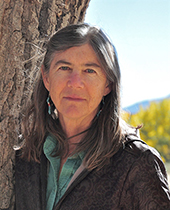 We used to play, long before we bought real houses.
We used to play, long before we bought real houses.
A roll of the dice could send a girl to jail.
The money was pink, blue, gold, as well as green,
and we could own a whole railroad
or speculate in hotels where others dreaded staying:
the cost was extortionary.
At last one person would own everything,
every teaspoon in the dining car, every spike
driven into the planks by immigrants,
every crooked mayor.
But then, with only the clothes on our backs,
we ran outside, laughing.
We do not accept unsolicited manuscripts. American Life in Poetry is made possible by The Poetry Foundation (www.poetryfoundation.org), publisher of Poetry magazine. It is also supported by the Department of English at the University of Nebraska, Lincoln. Poem copyright ©2016 by Connie Wanek, “Monopoly,” from Rival Gardens: New and Selected Poems (Univ. of Nebraska Press, 2016). Poem reprinted by permission of Connie Wanek and the publisher. Introduction copyright ©2017 by The Poetry Foundation. The introduction’s author, Ted Kooser, served as United States Poet Laureate Consultant in Poetry to the Library of Congress from 2004-2006.
Spread the word!
Bennington Review is Staying Alive
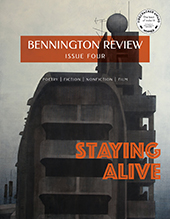 I was relieved to see it wasn’t just me who heard the Bee Gees in my head when I saw the cover of Bennington Review Issue Four themed “Staying Alive.” Editor Michael Dumanis opens the “Note from the Editor” with these two lines from the 1977’s classic, “Life goin’ nowhere, somebody help me / Somebody help me, yeah, I’m stayin’ alive.”
I was relieved to see it wasn’t just me who heard the Bee Gees in my head when I saw the cover of Bennington Review Issue Four themed “Staying Alive.” Editor Michael Dumanis opens the “Note from the Editor” with these two lines from the 1977’s classic, “Life goin’ nowhere, somebody help me / Somebody help me, yeah, I’m stayin’ alive.”
Dumanis explains, “As we were reading the poems, stories, and essays submitted to Bennington Review in 2017 for this, our fourth issue, we noticed a word that come up with remarkable regularity – the verb ‘survive’ in all its various permutations. In Issue Four, it occurs – frequently as a directive, occasionally as the noun ‘survivor’ – twenty-eight times. The word ‘living’ can be found twenty-one times, an the word ‘alive’ shows up an additional twelve.”
A “tonal shift” from their previous issue, themed “Threat,” Dumanis notes that “something has shifted in the cultural landscape. An acceptance of threat has bred a series of reactions – resistance, perseverance, even a measure of optimism . . . there’s now a restored sense of agency.”
Readers can find works by Patrick Williams, Erin L. McCoy, Marco Wilkinson, Ian Stansel, A. Molotkov and many more, with several contributors’ works available to read online.
Stayin’ alive? I’m all for it.
Spread the word!
Brevity Craft Essays
 In addition to its regular content of ‘extremely brief’ (under 750 words) nonfiction, Brevity‘s regular feature of Craft Essays in its first issue of 2018 features Chelsey Dyrsdale’s “Transforming an Essay Collection into a Memoir,” Annelise Jolley’s “Capturing the Numinous: Mary Karr’s Sacred Carnality,” and Felicia Rose Chavez’s [pictured] “The Mental Load: Honoring Your Story Over Your To-Do List.” All of Brevity‘s content is available online for free. No reason not to stop on by.
In addition to its regular content of ‘extremely brief’ (under 750 words) nonfiction, Brevity‘s regular feature of Craft Essays in its first issue of 2018 features Chelsey Dyrsdale’s “Transforming an Essay Collection into a Memoir,” Annelise Jolley’s “Capturing the Numinous: Mary Karr’s Sacred Carnality,” and Felicia Rose Chavez’s [pictured] “The Mental Load: Honoring Your Story Over Your To-Do List.” All of Brevity‘s content is available online for free. No reason not to stop on by.
Spread the word!
Interview :: The Godfather – of Nonfiction – Speaks
 In “The Godfather Speaks,” 3QR: The Three Quarter Review interviewed Lee Gutkind on the two-decade anniversary of the controversial Vanity Fair article, in which critic James Wolcott “accused creative nonfiction writers, of memoir in particular, of ‘navel gazing’ . . . lambast[ing] the form itself as: a ‘sickly transfusion, whereby the weakling personal voice of sensitive fiction is inserted into the beery carcass of nonfiction.‘” Wolcott labeled Gutkind as “The Godfather behind creative nonfiction.”
In “The Godfather Speaks,” 3QR: The Three Quarter Review interviewed Lee Gutkind on the two-decade anniversary of the controversial Vanity Fair article, in which critic James Wolcott “accused creative nonfiction writers, of memoir in particular, of ‘navel gazing’ . . . lambast[ing] the form itself as: a ‘sickly transfusion, whereby the weakling personal voice of sensitive fiction is inserted into the beery carcass of nonfiction.‘” Wolcott labeled Gutkind as “The Godfather behind creative nonfiction.”
Gutkind reflects on what could have been devastating to some in their careers: “The Godfather label—the positive aspects of it—stuck. From that point on, emboldened, I was much more in an offensive rather than a defensive mode when it came to creative nonfiction.” And for this, we are all grateful to The Godfather.
Spread the word!
Bearing Arms Broadside Collection
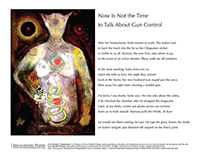 “Bearing Arms: Responding to Guns in American Culture” is the new special “Responses” collection from Broadsided Press. The editors put out a call for visual art and then words in response to those images. All six collaborations – by Maureen Seaton and Jonathan Clyde Frey; Jonathan Baxter and Dixie Salazar; Daniel Aristi and Sandra Cohen; Melissa Fite Johnson and David Kamm; Jennifer Perrine and Kristen Woodward; and Gregory Stapp and Osceola Refetoff – are available for free, full-color download to print, post, and share in your communities. Please do so!
“Bearing Arms: Responding to Guns in American Culture” is the new special “Responses” collection from Broadsided Press. The editors put out a call for visual art and then words in response to those images. All six collaborations – by Maureen Seaton and Jonathan Clyde Frey; Jonathan Baxter and Dixie Salazar; Daniel Aristi and Sandra Cohen; Melissa Fite Johnson and David Kamm; Jennifer Perrine and Kristen Woodward; and Gregory Stapp and Osceola Refetoff – are available for free, full-color download to print, post, and share in your communities. Please do so!
Spread the word!
Blink-Ink – 2017
I have a soft spot in my heart for diners. I’ve spent countless nights at 24-hour restaurants, sipping bad coffee and shoveling down greasy food. At diners, you can sit and write as you study the cast of characters around you, you can escape responsibilities for a while, you can blend in and cease to exist in your sticky booth. The writers in Issue 30 of the pocket-sized Blink-Ink explore the different aspects of diners, all in 50-words or less.
Spread the word!
The American Poetry Journal – December 2017
With 2017 over and two weeks into the new year, it kind of feels like getting through last year was surviving something. Reading the December 2017 issue of The American Poetry Journal, I found myself drawn to poems that consider different types of survival.
Continue reading “The American Poetry Journal – December 2017”
Spread the word!
From the Depths – 2017
Sometimes one feels the need to explore the darkness bubbling below the surface. From the Depths from Haunted Waters Press provides such an experience with poetry and prose that raises goosebumps. This issue features the winners and runners-up of the Haunted Waters Press Fiction & Poetry Open, and the Haunted Waters Press Short Shorts Competition for an added treat.
Spread the word!
Poetry – December 2017
Harriet Monroe founded Poetry magazine in 1912 with the aim to “print the best English verse which is being written today, regardless of where, by whom, or under what theory of art it is written.” Now, over a hundred years since its inception, Poetry has stayed true to Monroe’s vision, following the art in whatever form it takes, lending pages to the words that need them most. Far from blindly crashing into the future, though, Poetry remembers its history. Volume 211 begins with a tribute to Richard Wilbur, who passed this past year.
Spread the word!
Vallum – 2017
This literary magazine is excellent for anyone who enjoys thought provoking poems. In this issue of Vallum, the focus is on “Lies and Duplicity,” and features a number of great poets, a collection of visual art, a conversation with poet Rae Armantrout, and book reviews by various authors.
